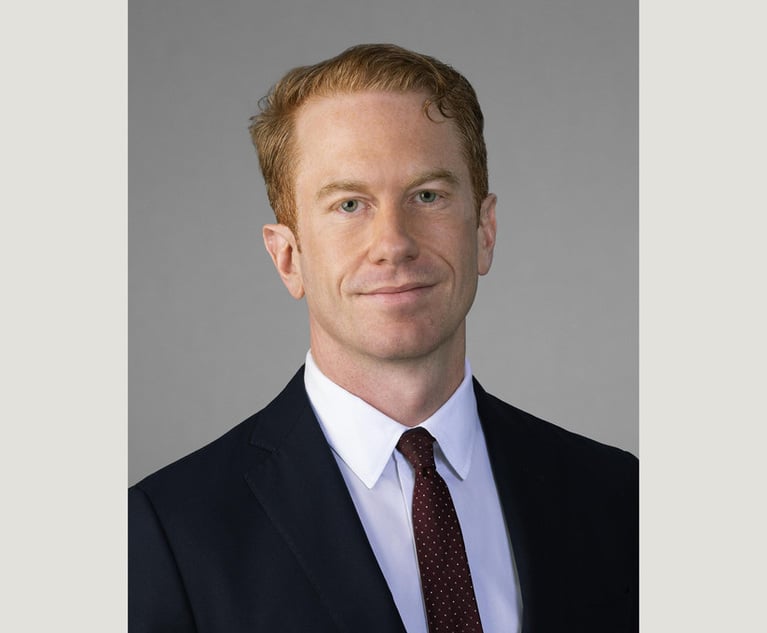When a Critical Spotlight Shines on Firms, Keeping Quiet Doesn't Help
Law firms face a delicate balancing act in responding to internal crises that draw public attention.
April 30, 2019 at 07:00 PM
6 minute read

There's an emerging consensus among public relations experts when dealing with rough news: “No comment” doesn't cut it.
“Companies and individuals need to articulate the positions that they have, especially when they're being criticized or are involved in a controversy where news can travel at light speed,” says Joshua Galper, a partner at Washington, D.C.'s Davis Goldberg & Galper. “People need to get out in front of it.”
Law firms aren't free from this expectation. But in responding to crises, they still face a delicate balance as they navigate how to convey a sense of empathy while waiting for the facts to become clear.
“I've witnessed this enough times to see how the long-term implications play out for firms that say too much early on and for firms that don't say enough or anything,” lawyer and marketer Gina Rubel noted in March, when Willkie Farr & Gallagher was dealing with the fallout of former co-chairman Gordon Caplan being charged in the nationwide college admissions scandal.
The New York firm received criticism for not offering a forceful condemnation of Caplan's alleged conduct that went beyond a terse five-sentence statement acknowledging the “seriousness” of the matter and announcing that he had been placed on leave. Lawyer Lanny Davis, Galper's colleague and a pioneer in the field of crisis management, asks, “What's wrong with a good fact?” But Willkie has refused to acknowledge whether Caplan's conduct is the subject of an internal investigation.
Willkie is just one of a handful of firms that have been thrust into the public spotlight against their will since the start of 2018. Here's a look at how the others have responded, and how that matches up with what crisis managers advise:
In March 2018, Latham & Watkins chairman William Voge abruptly left his post and resigned from the firm over what the firm said was inappropriate “communication of a sexual nature” with a woman who had no connection to the firm or any client.
When the news broke, Latham issued a lengthy statement outlining the nature of Voge's conduct but avoiding details. The firm explained that Voge's actions did not involve clients, attorneys or staff at the firm and were not unlawful, but at the same time were “not befitting the leader of the firm.”
The firm's announcement of the resignation also featured a statement by Voge himself, acknowledging a personal mistake and expressing disappointment in his own actions.
In the aftermath of Voge's ouster, Latham drew praise for its handling of the matter, although its efforts were eased by Voge voluntarily disclosing his conduct to the firm's executive committee, a detail also included in the firm's statement.
“They're fine,” Rubel says. “They removed the problem, they addressed the problem, and they've moved on to do the work that they do every day for their clients.”
A month later, Morrison & Foerster was accused by three female associates in a federal class action lawsuit of routinely holding back mothers and pregnant women. The suit, one of a bevy filed against Big Law firms by plaintiffs firm Sanford Heisler Sharp, called Morrison & Foerster a “male-dominated hierarchy” and asserted that its culture has a particularly negative effect on women who are pregnant or returning from maternity leave.
The firm quickly issued a statement rejecting the women's allegations. Then, it elected to do more, recognizing that the accusations struck directly at its public image. Days after the suit was filed, chairman Larren Nashelsky got on the phone with Gina Passarella, the editor-in-chief of this magazine, to stand up for the firm.
“It's just not who we are, it's not what we value and it's, in fact, not how we operate,” Nashelsky said. “We are a diverse firm increasingly led by women lawyers that has been at the forefront of diversity of all kinds for decades now.”
Declining to address the specific allegations in the complaint, he went to a different set of facts, highlighting statistics showing that women comprised 60 percent of the firm's most recent partner class and 40 percent of its board and that 25 percent of U.S. partners are women. “Those are market-leading numbers,” he said.
Skadden, Arps, Slate, Meagher & Flom was in the headlines throughout 2018 for its connection to the criminal prosecution of former Trump campaign chair Paul Manafort and his work in Ukraine.
Former associate Alex van der Zwaan pleaded guilty last February to lying to investigators in the Mueller probe over his contacts with former Trump campaign aide Rick Gates. Van der Zwaan had already been fired the previous year, a spokeswoman for the firm said at the time, adding that his conduct was contrary to the firm's “values, policies and expectations.”
Skadden was even more muted when attorney Gregory Craig, former White House counsel to President Barack Obama, left the firm in April after his own efforts on behalf of the Ukraine's Ministry of Justice came under fire. “You are welcome to report he is no longer with the firm,” a spokesperson told one reporter in a statement.
The firm offered a little more, but not much, when it signed a $4.6 million civil settlement this January with the Department of Justice, acknowledging that it was obligated to register under the Foreign Agents Registration Act for its Ukraine work. “We have learned much from this incident and are taking steps to prevent anything similar from happening again,” read part of the firm's lean statement.
If expansive words aren't its forte, Skadden did draw praise among observers for swiftly accepting responsibility, making clear it was ready to put the episode behind it.
Finally, in April, Sanford Heisler Sharp struck again, this time hitting Jones Day with a gender bias suit with allegations far more inflammatory than those it leveled against Morrison & Foerster. It depicted a firm where pregnant women and mothers are denied opportunities and a fraternity-like culture imposes obstacles to all women succeeding, unless they are willing to capitulate to the sexist environment. The suit also pointed a finger at the top, implicating the autocratic leadership of longtime managing partner Stephen Brogan.
The firm's response? Complete silence for nearly four days—well through the initial flurry of interest—before posting a statement on its website (and not immediately alerting the press) extolling its record of advancing working mothers.
Ironically, in February, Jones Day finished No. 1 (just ahead of Skadden) in a ranking of law firm brand strength. If it manages to stay on top in 2020 for the fourth straight year, maybe there will be something to be said for using those first days to keep quiet.
Email: [email protected]
This content has been archived. It is available through our partners, LexisNexis® and Bloomberg Law.
To view this content, please continue to their sites.
Not a Lexis Subscriber?
Subscribe Now
Not a Bloomberg Law Subscriber?
Subscribe Now
NOT FOR REPRINT
© 2025 ALM Global, LLC, All Rights Reserved. Request academic re-use from www.copyright.com. All other uses, submit a request to [email protected]. For more information visit Asset & Logo Licensing.
You Might Like
View All

What Happens When Lateral Partners’ Guaranteed Compensation Ends?

Latham Adds Former Treasury Department Lawyer for Cross-Border Deal Guidance
2 minute read
Wachtell Partner Leaves to Chair Latham's Liability Management Practice
2 minute readTrending Stories
- 1Public Notices/Calendars
- 2Wednesday Newspaper
- 3Decision of the Day: Qui Tam Relators Do Not Plausibly Claim Firm Avoided Tax Obligations Through Visa Applications, Circuit Finds
- 4Judicial Ethics Opinion 24-116
- 5Big Law Firms Sheppard Mullin, Morgan Lewis and Baker Botts Add Partners in Houston
Who Got The Work
J. Brugh Lower of Gibbons has entered an appearance for industrial equipment supplier Devco Corporation in a pending trademark infringement lawsuit. The suit, accusing the defendant of selling knock-off Graco products, was filed Dec. 18 in New Jersey District Court by Rivkin Radler on behalf of Graco Inc. and Graco Minnesota. The case, assigned to U.S. District Judge Zahid N. Quraishi, is 3:24-cv-11294, Graco Inc. et al v. Devco Corporation.
Who Got The Work
Rebecca Maller-Stein and Kent A. Yalowitz of Arnold & Porter Kaye Scholer have entered their appearances for Hanaco Venture Capital and its executives, Lior Prosor and David Frankel, in a pending securities lawsuit. The action, filed on Dec. 24 in New York Southern District Court by Zell, Aron & Co. on behalf of Goldeneye Advisors, accuses the defendants of negligently and fraudulently managing the plaintiff's $1 million investment. The case, assigned to U.S. District Judge Vernon S. Broderick, is 1:24-cv-09918, Goldeneye Advisors, LLC v. Hanaco Venture Capital, Ltd. et al.
Who Got The Work
Attorneys from A&O Shearman has stepped in as defense counsel for Toronto-Dominion Bank and other defendants in a pending securities class action. The suit, filed Dec. 11 in New York Southern District Court by Bleichmar Fonti & Auld, accuses the defendants of concealing the bank's 'pervasive' deficiencies in regards to its compliance with the Bank Secrecy Act and the quality of its anti-money laundering controls. The case, assigned to U.S. District Judge Arun Subramanian, is 1:24-cv-09445, Gonzalez v. The Toronto-Dominion Bank et al.
Who Got The Work
Crown Castle International, a Pennsylvania company providing shared communications infrastructure, has turned to Luke D. Wolf of Gordon Rees Scully Mansukhani to fend off a pending breach-of-contract lawsuit. The court action, filed Nov. 25 in Michigan Eastern District Court by Hooper Hathaway PC on behalf of The Town Residences LLC, accuses Crown Castle of failing to transfer approximately $30,000 in utility payments from T-Mobile in breach of a roof-top lease and assignment agreement. The case, assigned to U.S. District Judge Susan K. Declercq, is 2:24-cv-13131, The Town Residences LLC v. T-Mobile US, Inc. et al.
Who Got The Work
Wilfred P. Coronato and Daniel M. Schwartz of McCarter & English have stepped in as defense counsel to Electrolux Home Products Inc. in a pending product liability lawsuit. The court action, filed Nov. 26 in New York Eastern District Court by Poulos Lopiccolo PC and Nagel Rice LLP on behalf of David Stern, alleges that the defendant's refrigerators’ drawers and shelving repeatedly break and fall apart within months after purchase. The case, assigned to U.S. District Judge Joan M. Azrack, is 2:24-cv-08204, Stern v. Electrolux Home Products, Inc.
Featured Firms
Law Offices of Gary Martin Hays & Associates, P.C.
(470) 294-1674
Law Offices of Mark E. Salomone
(857) 444-6468
Smith & Hassler
(713) 739-1250










